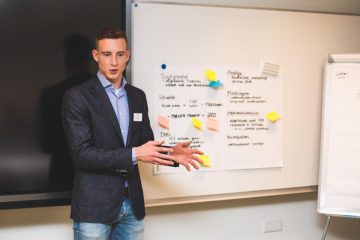Dear reader,
My name is Daan van Hulten and I was chairman of the board in the year 2014-2015. After six years, of which my last year was my board year, I left Tilburg University as a graduate. Currently I am a management trainee at PostNL in the area of finance.
People used to ask me why I did a board year after my Master’s degree, because: “why not start working?”. I used to tell them that I did it because I wanted to be in the board of my association and because I thought I would learn a lot. But of course, back then I did not know what I was going to learn. Now, some time later, I do know what I learned and I am writing this article so that people who are thinking about a board year, not knowing what to expect, can read about the experiences I had.
My board year started already great, since I was lucky enough to have four awesome board members, who were all active at Asset | Strategy & Logistics for a while. Together, all very enthusiastic, we wrote a policy during the summer which we presented during the first Department Members Meeting. After that moment, we were the official board of Asset | Strategy & Logistics and it was up to us to deliver on the policy we presented. This has been a very educational experience, since together we had to make sure we also focused on the policy, besides all the daily tasks. Especially in the beginning, the daily tasks take up a lot of time and when you get the feeling you do not get everything done, you learn to talk about it with your fellow board members. This is also what your weekly board meetings are for. You use them to discuss progress and issues, but also to talk about experiences and feelings towards each other. Since you work fulltime with each other, and together you are responsible for the whole association this was very different than in all my previous experiences, such as group assignments, committees, or my part time job. You are so dependent on each other that you (have to) learn to communicate in the best possible way and do not hold any stuff back. Because you are all responsible, it can sometimes be difficult, but it also creates a strong bond, which helps you develop as a team.
I have used close to nothing of my Master in Finance, and all skills I do use, I acquired during my board year.
Along the way, I felt I was getting the hang of it. Regardless of the function in a board, everyone still has to deal with a lot of different meetings, tasks, and projects. This is one of the things which make it a lot of fun. You do not have an “ordinary day” because apart from a few meetings you have every week, a lot is depending on the agreements you make in a board meeting and what is happening that week. Noticing that some things are really ad hoc makes you see that you can improve the way you and your board “do business”. I use this term, because running an Asset department is really like running your own business, and thus also making sure that you optimize processes in your organization. This feels awesome and also improves your critical view on the way people (including yourself) handle issues and if that is the best way to do it. This is a skill you can use later both in business and in your private life.
When you are getting more experienced and have done recurring tasks more often, you get the feeling you can do more. Taking new initiatives, thinking about all sorts of things that can improve the association, and working on it feels great, but also can put pressure on you. Dealing with this and getting a feeling for time management learned me to be more effective in planning. I already learned a lot during my master, but it gets very different when you also have to deal with a lot of people along the way. The beauty of a board year at Asset, is that there are a lot of parties involved, besides your own board and (active) members. Working together with other departments, the Economic Business Weeks Tilburg, and discussing matters with the university or other associations really adds a lot to your “stakeholder view”. This also helps you learn how to prioritize, which is greatly appreciated later in business life.
I can still say it was the best and most educational year of my life thus far.
When reflecting on my board year and thinking about the months after, I have to say I am extremely grateful for this year. Sure, it helps your CV (a lot of companies nowadays dig it), but it also helps you in the next rounds when applying for a job. I will not elaborate on the STARR method (since everyone probably knows it), but it’s still used a lot and experiences from your board year can help a great deal in giving a confident answer during your interview(s), since you have countless examples of ‘initiative taking’ , ‘tough times’ , and ‘dealing with colliding opinions’. I recently read an article stating that the question someone’s financial success is determined for 85% by his ability to communicate, negotiate, and lead and just for 15% by his/her hard skills. In my short ‘working-life’ this far, I am able to say that I have used close to nothing of my Master in Finance, and all skills I do use, I acquired during my board year.
Of course, some of the things I said, don’t just apply to a board year and can also be learned in for example an internship. What makes a board year unique, however, is that you learn to work together in a fully committed team with the same goal, for a whole year. This ensures a steep learning curve. But most of all working together towards the goals you yourself set as a team, has been the coolest experience of all to me. It is that and the experiences I elaborated on before, that I can still say it was the best and most educational year of my life thus far.
Hope to see you on the announcement drink (and hopefully on the stage)!
Daan van Hulten
Chairman Asset | Strategy & Logistics 2014-2015



0 Comments